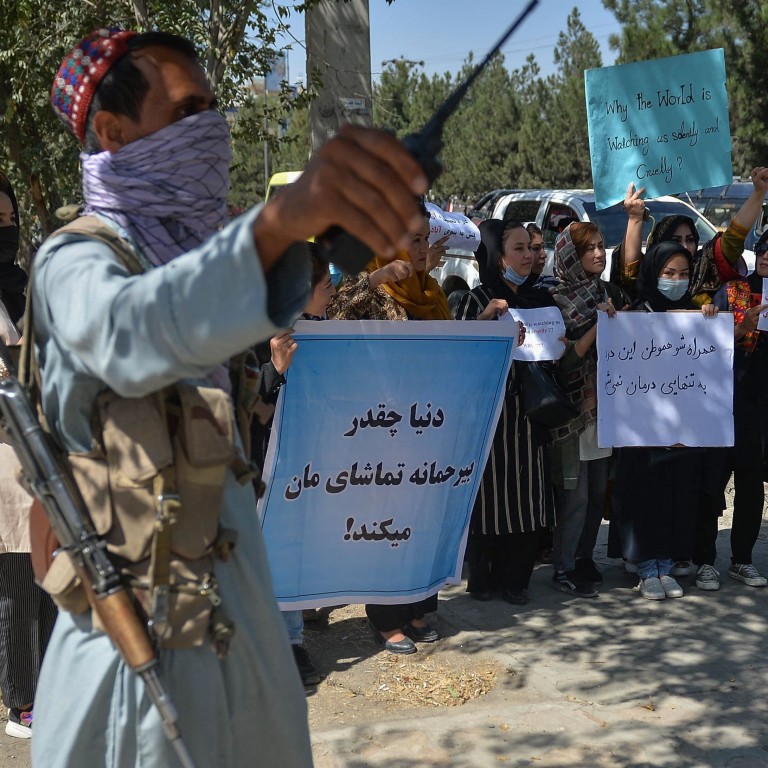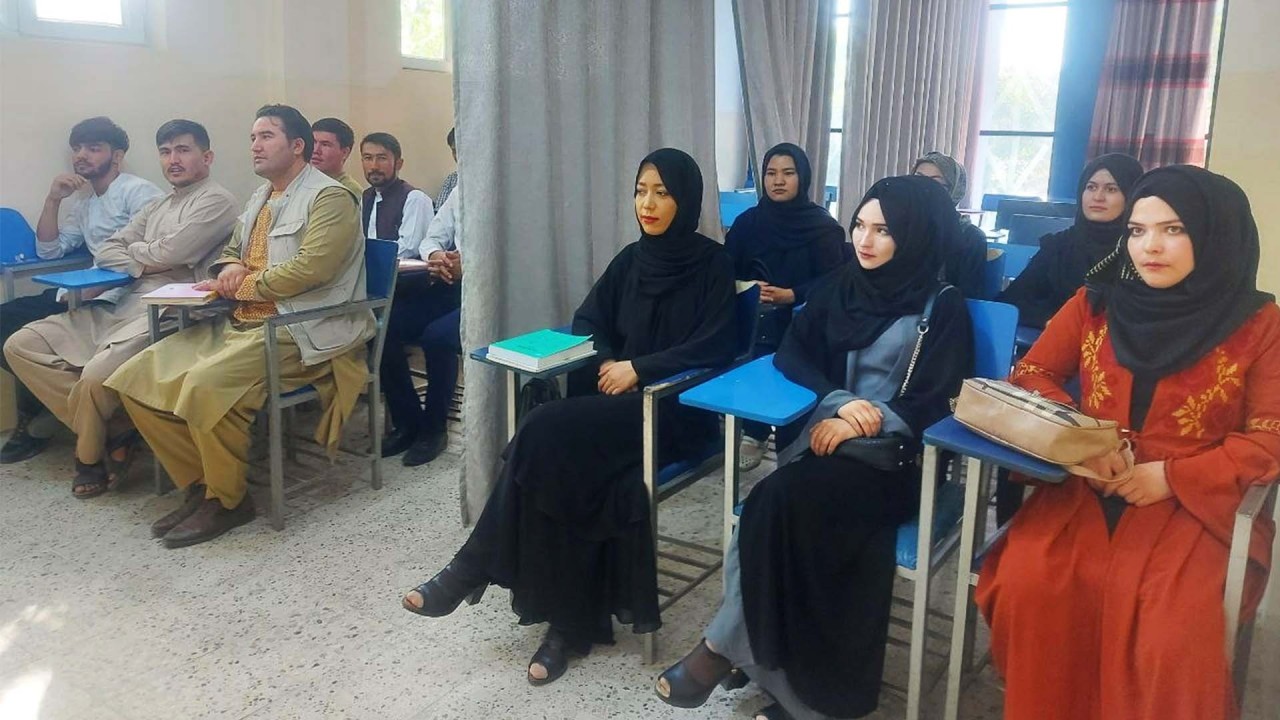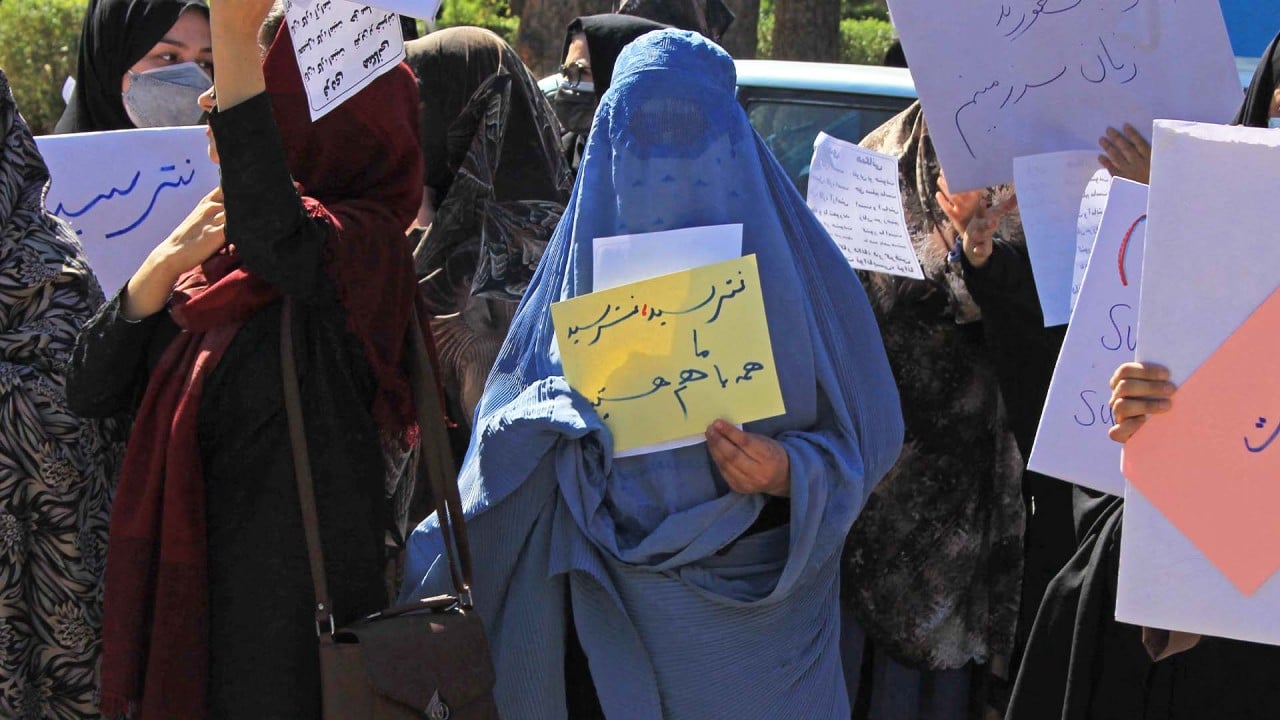
Afghanistan: Women’s protests keep pressure on Taliban, which responds again with force
- Fighters whip demonstrators and detain journalists, as rallies put the new caretaker government to the test
- The interim Cabinet is composed exclusively of Taliban stalwarts and apparatchiks, with no women or former political figures and few minorities
After being completely shut out from the Taliban‘s new government, women kept up the pressure on Afghanistan‘s new rulers with a number of protests Wednesday, at least one of which was violently broken up by Taliban fighters who whipped some of the demonstrators and detained local journalists.
The protests come one day after the Taliban announced an interim Cabinet composed exclusively of the group’s stalwarts and apparatchiks, with no women or former political figures and few minorities.
Although the rallies were small, with only a few dozen women in each case, they put the new government to the test after it explicitly declared that taking part in – and covering – protests that were not cleared beforehand with the administration to be illegal.
They also illustrated the larger reality that, though the Taliban may now stand virtually unchallenged on the battlefield, the group faces a more complicated task in getting fearful Afghans – especially women and those living in cities – to accept its rule.

02:19
Curtains divide female, male students as Afghan universities reopen under Taliban rule
The protesters assembled Wednesday at 8am near a bank on the main thoroughfare bisecting Dasht-e-Barchi, a southwestern Kabul neighbourhood dominated by the minority Hazara community.
They stood in a shallow semicircle and raised simple printed signs in Dari and English. One of them read “Why is the world watching us silently and cruelly?” with emphasis in red marker on the “silently” and “cruelly”.
Soon after, they began their march down Shaheed Mazari Road, holding up their signs and shouting, “Azadi!” – freedom – as a parade of minivans, motorcycles and ’90s Toyota Corollas passed by them.
Trailing at the back was Rahela Talash, who along with her colleague was lugging a portable speaker with a broken handle.
Key players in the Taliban’s new Afghan government
Like many of those with her, she had several reasons to oppose the new government.
“No women, no Hazara [in government]. It’s completely wrong. This is why we are here,” she said, adding that the Taliban’s government was almost completely chosen from the dominant Pashtun ethnic group.
Although the Taliban insists the government it announced Tuesday is an interim one, it has not elaborated on what would trigger the formation of a permanent Cabinet or how it would be chosen.
There was also a notable omission compared to the government of deposed President Ashraf Ghani: The Ministry of Women’s Affairs, which had existed since late 2001, after the Taliban was booted from power by a US-led invasion, appears now to have been disbanded, a move that enraged many of those at Wednesday’s protest.

“It’s completely wrong that they don’t think about us. We’re half of this society. They have to consider us,” said Mariam Shafaii, a 19-year-old student.
The government reiterated on Wednesday that unauthorised protests were now illegal.
“For the past few days, a number of people in Kabul and other provinces have taken to the streets in the name of demonstrations, disrupting security, harassing people and disrupting normal life,” the interior ministry said in a statement. “All citizens are informed that for the time being, they are not [to try] to hold demonstrations under any name or title.”
But Shafaii said she would not be deterred by the injunctions.
“We will not keep quiet. We will keep our protests,” she said.
Taliban ‘killed pregnant ex-policewoman’ in Afghanistan
In another sobering development, the Taliban has reinstituted a ministry for the promotion of virtue and prevention of vice, which was notorious during the group’s 1996-2001 rule for its brutal enforcement of the Taliban’s ultraconservative brand of Islam. The ministry presided over the amputation of thieves’ hands and the stoning deaths of women found guilty of adultery.
On Wednesday, after 45 minutes of walking, the protesters in Kabul came upon a beige Humvee parked to the side, and four Taliban fighters moved to push the women back. Despite the weathered AK-47s they carried, the women swarmed toward them, shouting and arguing at the leader until he relented and allowed them to continue.
But other fighters near the Karte Char police station, close to the centre of Kabul, were less tolerant.
There, another group of demonstrators shouted and toted signs before a gaggle of bewildered Taliban members, many of them young men from Afghanistan’s rural areas, where little of the West’s campaign for female equality has trickled down over the last 20 years.

01:39
Women protest in Afghanistan for female representation in Taliban’s new cabinet
When two Los Angeles Times journalists approached, the fighters broke away from the protest and surrounded them, lunging for one of the journalists’ cameras. They then aggressively shoved them toward the police station, where a number of local journalists had already been detained.
“It’s not allowed to photograph these protests,” one of the Taliban leaders said after examining a media permit. “They are illegal, and you must delete any photos taken there.”
Another, younger Taliban fighter with kohl-lined eyes said it was forbidden to photograph women.
“Why are you doing this? This is against Islam,” he said.
The Times journalists were escorted to their car and were watched until they left.
Taliban pledges safety for humanitarian workers, UN says
Meanwhile, five journalists from Etilaat Roz, a local newspaper, remained inside the station; two of them had been arrested earlier, at the start of the protest. When an editor and two other Etilaat journalists came to the station to try to persuade the Taliban to release their colleague, they, too, were detained. Also taken into custody was a local producer with Euronews.
The Euronews producer was repeatedly slapped in the face by three of the Taliban members there, who took his phone and wallet, a colleague said. Both were returned when he was released, and he was otherwise unhurt.
The Etilaat reporters first arrested were taken into separate rooms, then insulted and flogged by the Taliban, said Zaki Diryabi, Etilaat Roz’s publisher. The pair emerged with bruises, angry welts and red lash marks from what appeared to have been a beating with whips or cables.
“They were hurt everywhere. We sent the two of them to the hospital,” Diryabi said, adding that after treatment they were sent home to convalesce for two weeks.

A video released later of one of the reporters shows him unable to walk unaided, limping as he is supported by two of his colleagues.
The Taliban’s wrath extended to the women at that same protest. A video posted on social media showed a Taliban fighter using his whip to lash one of the demonstrators; several women scream and move away.
Ghani, the deposed president who fled the country when the Taliban reached Kabul, issued a statement on Wednesday saying that leaving the capital was “the most difficult decision of my life”. But he said he believed it was the only way to save the city and that he had no intention of abandoning the Afghan people.
He rejected allegations that he had absconded with public funds and said he was willing to submit his finances and those of his close aides to an independent audit.
He also urged Afghans to embrace the country’s 2004 constitution, and that the Afghan tradition of jirga and shura – consultative meetings – “can provide a platform for peaceful outcomes for the country moving forward”.

